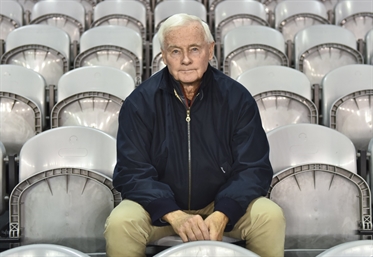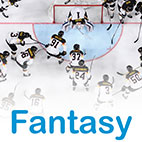Hail to the King: Part 2
Hail to the King: Part 2
King talks Russia, rule changes, and running

 PARIS, FRANCE - MAY 10: Dave King of team Canada poses for a photo during team Canada practice - 2017 IIHF Ice Hockey World Championship. (Photo by Matt Zambonin/HHOF-IIHF Images)
PARIS, FRANCE - MAY 10: Dave King of team Canada poses for a photo during team Canada practice - 2017 IIHF Ice Hockey World Championship. (Photo by Matt Zambonin/HHOF-IIHF Images)
When you coached at the Olympics, the Russians were always the odds-on favourites to win gold. They haven’t even medaled since taking the bronze in Salt Lake City in 2002. Besides all the other countries having access to all their top players at recent Olympics, what do you see as the main reasons for Russia’s decline?
It’s very difficult to bring players in from different teams and bring them together. We talked about Babcock being able to do that. For the Russian coaches, it’s different, because when their players play in the NHL, they play a different style. So they have to overcome a different style very quickly and get back to their collective Russian game. And it just seems like they can’t quite get that to work.
In the Russian system, when they were at their best, the puck carrier was subordinate to the other four guys. Now, when you play in the NHL, you learn that when you have the puck, you almost control the other four guys. So, it’s really, really different for the Russians to have to put their team together. Before, they always had time on their side, a fixed group of players, readily accessible to the coaches. Now, it’s a short-term, quick fix. And that isn’t the Russian way.
How about line-matching? Anatoli Tarasov and Viktor Tikhonov would roll four lines who had superior conditioning and had played together all year. Today, you still see Russian coaches that do the same thing, while other nations match lines. Is that bemusing to you?
I’ve coached in the KHL twice, and so I can say that’s true. There are times when coaches there don’t use bench management as much as we do in North America. Oleg Znarok is a little different. He’s got the combination of the best of both worlds. He’s a good Russian coach who does a really good job. He understands the line-matching, and manages his team better than most Russian coaches. That’s why he’s so successful.
Fans in North America sometimes forget that the Czechoslovaks also fielded great teams during your international heyday. What are your memories of facing stars like Igor Liba and Dusan Pasek?
They were amazing players. Everybody does talk about the Russians in that era being so good, but the Czechoslovaks were right there with them. They had wonderful teams. At the World Championships, often that was the best opponent the Russians would meet. Team Canada, we’d go over and be competitive, and we’d get some medals sometimes. But the Russians’ toughest games were always against Czechoslovakia. They really operated the same program: 11 months on the ice, players living in a baza or dormitory, the coach having a lot of control of their time.
One of the best games I ever saw was at the 1982 World Championship in Helsinki. The Russians and Czechoslovaks played to a 0-0 draw. It was an amazing game. It sounds like it should have been boring, but it was unbelievable. They were really good opponents.
Ten years ago, you coached Ilya Vorobiev with Metallurg Magnitogorsk. He’s gone on to great success with that club in your old job, including a Gagarin Cup in 2016. Are you surprised?
No, I’m not surprised, because when Ilya played the game, you could tell he understood the game. He’s got it in his genes. His father Pyotr Vorobiev is a very famous Russian coach. He’s coached the national team a bit, national B teams, and he’s a really good hockey coach. I actually took over from him with Lokomotiv Yaroslav a few years ago. So Ilya comes by this very naturally because his dad was a great coach. And Ilya is a bright guy. He speaks three or four languages.
Magnitogorsk has hired multiple North American coaches, including yourself, Mike Keenan, Barry Smith, and Paul Maurice. Have you offered advice to those guys since you were the forerunner?
In some cases, guys did call and ask what it was like. There’s a real fascination with coaching in Russia. It is going to be a different lifestyle for you, and there is a different hockey culture there. Anybody who’s asked advice, it’s been not so much about the tactical part of the game, but the cultural part. How do you deal with the players? How do you deal with the translation issue? What can you do or not do? It’s a great place to coach. I recommend that anybody who gets to coach in Russia, you’re coaching at a high, high level. It’s a great league, the KHL.
If you were in charge of making rule changes in hockey, what changes would you like to make?
Way back, when Gary Bettman wanted to improve the game – and I think it’s a good way to do it – he came up with zero tolerance, which is a good idea, because there’s way too much stick interference. They brought in two referees. So now you have zero tolerance and two referees. It gave the game more control, and I think it was done to make the quality of the game better. But they also made the end zones very large. They took eight feet out of the neutral zone and added four feet to each end zone.
Now, in the modern game, so often I see this 30-to-40-second puck control, 5-on-5, and it looks like a 5-on-4 power play, but it’s this continuous, monotonous cycling. No one can get inside. Teams protect the inside so well. So what they did to generate offense hasn’t really worked. I like zero tolerance and two referees. Those are great things. But we should go back to smaller end zones and a larger neutral zone. I think we’d get more scoring opportunities with more speed through the neutral zone. And then teams couldn’t play that delayed trap that they play now.
You’ve coached with four NHL organizations: Calgary, Montreal, Columbus, and Arizona. What do you regard as your personal NHL highlights?
Any time you get to coach with the Montreal Canadiens, that’s special. I was very fortunate to work with Alain Vigneault, which I enjoyed. Montreal was so special, because the Rocket was still alive and would come to some games. Mr. Beliveau was still alive. I’d often see him in the office. That was very special. I enjoyed working with the Flames. But with the Columbus Blue Jackets, starting up an expansion team, that was a special, special opportunity, because it’s brand-new. You put your mark on it. I’ve been talking to Gerard Gallant, who’s on our coaching staff here, and he’s going to coach the new expansion team in Las Vegas. So it’s a great opportunity. Expansion is a lot of fun for a coach.
Your main legacy is in the IIHF world. How do you feel about dedicating your life to international hockey?
I’ve enjoyed it. It’s been a wonderful experience. I’ve learned a lot and travelled a lot. I’ve seen a lot of places I didn’t think I was ever going to see. It makes you appreciate that there is a different way to approach the game. When I first started in international hockey, I got a hybrid look at the game. I was able to see what we do so well in North America but also steal some ideas from that European game I like so much. I’ve always felt it was a rare opportunity.
What does going for a run every single morning do for you?
Geez, I’m coming up now on 30 years without missing a day. August 1 will mark my 30th year. That’s pretty good for an old guy. I’ve enjoyed that. I do it every day. It’s just become habit. It’s like getting up to shave in the morning. Going for my early morning run is just the way it always has been. It’s good for my fitness, which is important. But it also gives me some quiet time where no one can reach me by telephone. I do a lot of thinking.
I’ve made a lot of my most important decisions in hockey on a run. You can sort things out. You’re concentrating as you run. The atmosphere relaxes you a bit, and you see a little bit of a bigger picture. So I think running is a terrific thing for coaches to do. It gives you some time. Our game has a tendency to narrow your focus a lot. When you get your exercise with a morning run, you widen out a bit more and you see more. It’s good.
How likely is it that you'll be in Korea in February?
If it isn’t the NHL players, I’d be delighted to be part of it. I think any time you can be at the Olympics representing your country as a player or coach, those are special things. I’ve been lucky to be in a number of Olympics. It would be thrilling to do it again. I’ve got to tell you, it would be a very interesting challenge because it wouldn’t be a full-time team, it’d be a team that’s together on a rotational basis. It’s a great challenge for coaches.
This is the second part of the interview. Click here to access the first part.
Back to Overview
































































































